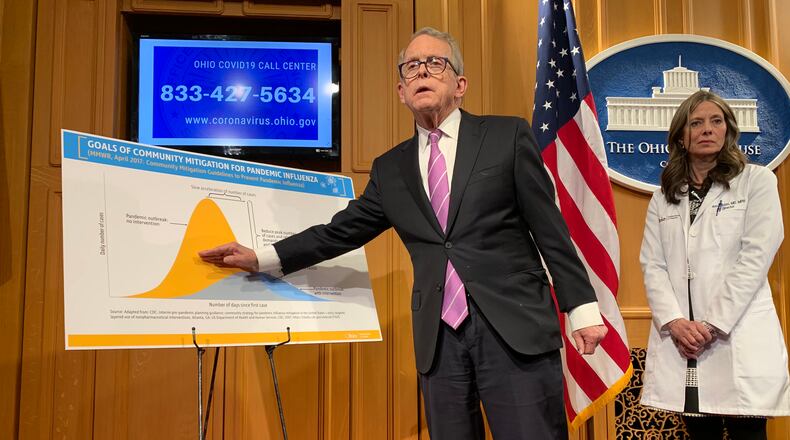DeWine and Ohio Department of Health Director Dr. Amy Acton have said a rationing of reagents has held Ohio and other states back from being able to test more people.
>> Coronavirus: Complete Coverage
DeWine also announced that he asked former Govs. Bob Taft and Richard Celeste to head a testing strike team that will try to alleviate bottlenecks in the supply chain for testing kits and other issues.
Increased testing is a key element to Ohio’s plan to gradually reopen businesses. DeWine cautioned that coronavirus cases may increase once people start back to work.
“Once you start opening things up, the contact increases. The key is to do it in a way that minimizes as much as humanly possible the risk,” DeWine said at his daily press briefing. “This is a balance. This is a high-wire act. This isn’t easy.”
The Ohio Department of Health announced 13,250 confirmed cases, plus 475 probable COVID19 cases; 2,779 hospitalizations; 538 deaths and another 19 deaths attributed to probable cases.
The governor said he’ll have more announcements in the coming days on reopening functions at Ohio hospitals. He also noted that he’s exploring with a regulatory board when and how to re-open barber shops and hair salons.
“As you can see, I’m past due for a haircut … The nature of it is it is close work,” he said. “You cannot stay six feet away and do that.”
>> Cash flow key to post-crisis economic recovery
Retail workers with underlying health concerns are worried about returning to their jobs and possibly being exposed to the virus.
“I don’t have a great answer for that,” DeWine said.
He added that he hopes employers are flexible with work assignments for those with health conditions.
Conditions that put people at higher risk for complications include obesity, tobacco use, lung disease, heart disease and diabetes — conditions that are common among large segments of Ohioans.
As the DeWine administration maps out what will open when and under what conditions, state officials will be relying again on modeling forecasts from the Ohio State University Infectious Diseases Institute.
Models make predictions based on current data and a host of assumptions, such as how people interact, where they live and work.
>> Stimulus: Wednesday deadline for SS recipient nonfilers with children
“At some point we can’t continue the complete stay at home orders that we have right now. So the question becomes how can we relax these distancing measures in a really graded manner so that as future outbreaks occur we can contain them,” said Michael Oglesbee, director of the OSU IDI.
Oglesbee said he expects Ohio will discourage large events, such as concerts, sporting events or festivals, though the end of July; retailers will continue to limit shoppers, wipe down carts, use masks and mandate social distancing; and restaurants offering dine-in meals may have to adapt.
“We’ve always had seating capacities as defined by fire codes and we may see seating capacities redefined based on infectious disease considerations. It’s hard for me to imagine we’re going to be in this take-out only mode until we have a vaccine,” Oglesbee said.
Ohio is building its capacity to conduct robust contact tracing — reaching people who have been in contact with those who test positive for the virus, he said.
>> Coronavirus: Black death rates disproportionate; DeWine launches minority health task force
A big increase in testing would give the state the true number of infections, Oglesbee said.
Ohio is conducting comprehensive testing in three state prisons and is finding a high rate of infections, including asymptomatic patients who do not realize they are carrying the virus. Currently one in four confirmed cases in Ohio is linked to the state prison system workers and inmates.
Acton said her department is awaiting testing supplies to conduct a survey of 1,000 randomly selected Ohioans to determine the prevalence of the virus spread.
RELATED CONTENT:
>> Hundreds of vehicles flock to Nutter Center for massive food relief effort
>> Marion prison becomes nation's leading coronavirus hotspot as advocates demand action
>> CDC: Poison centers see increase in cleaners, disinfectant exposures during coronavirus pandemic
>> Coronavirus: Urbana University to close, cease enrollment at end of semester
About the Author


